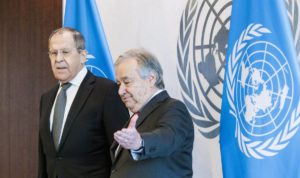Amidst Putin’s international isolation, away from foreign leaders, he is preparing for the BRICS Summit (Kazan, October 22-24) with exceptional effort.
In addition to the leaders of the Organization’s member states, which will gather in Tatarstan, the capital of one of the RF’s subjects, there will also be another invited guests. According to the aide to the President of the Russian Federation Yury Ushakov, representatives of 32 countries will take part in the BRICS Summit, in particular, 24 leaders of states.
The UN Secretary-General Antonio Guterres is among special guests of the Summit. The Kremlin plans to give him a warm welcome. Guterres’ arrival was announced by Deputy Minister of Foreign Affairs of the Russian Federation, Sergei Vershinin. Later it was confirmed by the official representative of the Russian Foreign Ministry, Maria Zakharova. Although the office of the UN Secretary-General does not comment on the future visit of its chief.

But does Guterres understand the potential consequences of his participation in the BRICS Summit? Or is he no longer interested in his own reputation or the image of the UN?
For Putin, the Summit in Kazan is an opportunity to show that he is not isolated internationally. This is a platform where he is going to unite the Global South countries around Russia and to try to build an anti-Western bloc together with Xi Jinping.

At the BRICS Summit in Kazan, Putin is also going to promote an alternative Chinese-Brazilian “peace plan” to resolve the “Ukrainian crisis.” Its goals are to undermine the already weak support for Ukraine from the countries of the Global South and Kyiv’s efforts to hold a second Peace Summit.
For the UN Secretary-General to visit an aggressor country which threatens the world with nuclear weapons is to show great disrespect to the victims of Russia’s invasion of Ukraine. These are new arguments for Moscow in its dialogue with the Global South. This is a gift to Putin, who wants to dismantle the existing world order and international law, asserting the right of the strongest.
The mere presence of the UN Secretary-General in Kazan would create for the Kremlin a positive information background for the BRICS Summit, many members of which are trying to turn this association into an anti-Western block. Guterres’ visit would give Russian propaganda a favourable media backdrop about the UN support of Chinese-Brazilian peace plan on Ukraine.
There is another meaning behind nice and right words about “respect for sovereignty, territorial integrity and the principles of the UN Charter” in the Chinese-Brazilian plan. It does not provide for the responsibility of the aggressor, and reparations for the destruction of Ukraine.
A strategy to freeze the conflict, deprive Ukraine of the right to liberate the territory occupied by Russia are hidden in the six points of the plan.

The UN is currently facing a serious crisis. Guterres’ authority has been lost by both his position regarding the Russian-Ukrainian war and his reaction to events in the Middle East. The Secretary-General was declared persona non grata by Tel Aviv, as he failed to forcefully condemn Iran’s latest missile attack on Israel.
Giving that Guterres did not take part in the Peace Summit in Switzerland, his visit to Russia (which is waging an unjust and aggressive war against Ukraine) is more than a manifestation of sympathy for the aggressor country.
And this is not the first time that such sympathy has been shown. Previously, Guterres was so interested in the grain deal to be resumed, that was willing to meet Russia’s interests. In particular, he has proposed lifting the financial sanctions imposed by the EU against the Russian Agricultural Bank (Rosselkhozbank) by using a subsidiary, specially designed by the Russian bank for this purpose; insuring Russian vessels against Ukrainian attacks while ensuring safe passage for Russian ships carrying food and fertilizer to EU ports.
In fact, these Guterres’ proposals nullified several international sanctions against Russia. The UN Secretary-General justified the need to resume the grain deal by the desire to avoid a global food crisis. But in reality, as the US pointed out, Guterres’ actions “undermined broader efforts to hold Moscow accountable for its actions in Ukraine.”

Even if Guterres travels to Kazan with the aim to achieve a just peace in Ukraine, Russian propaganda will undoubtedly portray his visit in a light favorable to Putin inside Russia and in the countries of the Global South. As a result, Guterres’ participation in the BRICS Summit risks not only damaging his personal credibility, but also that of the UN itself.

